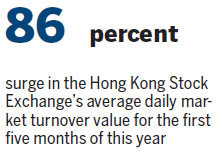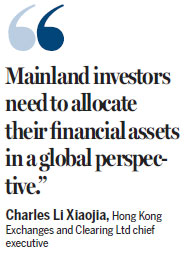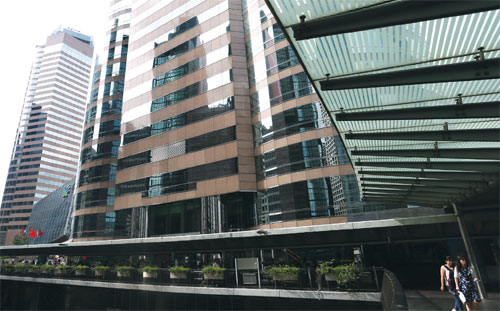Let's go the extra mile to tap wealth: Li
Updated: 2015-06-12 07:28
By Oswald Chan in Hong Kong(HK Edition)
|
|||||||||
SAR bourse chief calls for reciprocal trading in commodities, fixed-income sector between city and mainland
Hong Kong's bourse chief has called on the SAR and the mainland to further cash in on the growing affluence of mainland investors by allowing reciprocal trading in the commodities and fixed-income sector.
Such a move, on the heels of the successful launch of the Shanghai-Hong Kong stocks cross-trading program, will further cement Hong Kong's position as the region's largest offshore asset-management center for mainland investors, says Hong Kong Exchanges and Clearing Ltd (HKEx) Chief Executive Charles Li Xiaojia.
"After allowing reciprocal trading in the Shanghai and Hong Kong stock markets, both sides should further explore permitting reciprocal trading in the commodities and fixed-income segment," Li said on the sidelines of a financial forum in the city on Thursday.
"In the realm of fixed-income products, when the mainland embarks on interest-rate reforms, exchange rates in the Hong Kong offshore market can provide the benchmark for the mainland onshore market, and better help the mainland to mitigate risks in times of market turbulence," he said.
"Hong Kong and mainland should study reciprocal trading of exchange rate investment products, as a long-term development strategy to bolster Hong Kong's asset-management center status."
The Shanghai-Hong Kong Stock Connect, launched in November last year, allows the trading of 568 Shanghai-listed shares by Hong Kong and overseas investors with a daily quota of 13 billion yuan ($2.1 billion), as well as transactions of 266 Hong Kong-listed shares by mainland investors on a daily quota of 10.5 billion yuan.
The stocks link has boosted liquidity in the local share market, with average daily share market turnover by value hitting a record single-month high of HK$200 billion in April - up 121.8 percent on the previous month.
But, according to HKEx data, turnover in May slipped by 22.4 percent to HK$155.2 billion.
The average daily market turnover value for the first five months of this year soared by 86 percent to HK$121.4 billion, compared with the same period last year.
Li noted that with the rising affluence of mainland people, they need better financial planning solutions to manage their wealth.
"Mainland investors need to allocate their financial assets in a global perspective. Hong Kong should capitalize on its niches of high regulatory standards to entice more investors to transact, clear and settle their financial investments in the city, hence capturing opportunities offered by wealth transfer on the mainland," he said.
Bruno Lee Kam-wing, chairman of the Hong Kong Investment Funds Association, agreed that Hong Kong should do more to strengthen the local bond market to lift the city's asset-management status.
"Hong Kong should do more to entice more mainland companies to issue yuan-denominated bonds here, and explore some kind of mechanism to enable overseas investors to participate in mainland bond trading," Lee told China Daily.
"In due course, the city can develop its research capabilities in bond-market investment", while the training of more financial industry professionals is equally important.
"We need more finance professionals who have cultivated a deep knowledge of the investment market, so that they can provide proper wealth planning and asset allocation advice to clients to help them achieve their financial goals," Lee said.
oswald@chinadailyhk.com


|
The cross-trading of exchange rate investment products can serve as a long-term development strategy to bolster Hong Kong's asset-management center status, according to Charles Li Xiaojia, Hong Kong Exchanges and Clearing Ltd chief executive. Parker Zheng / China Daily |
(HK Edition 06/12/2015 page9)
